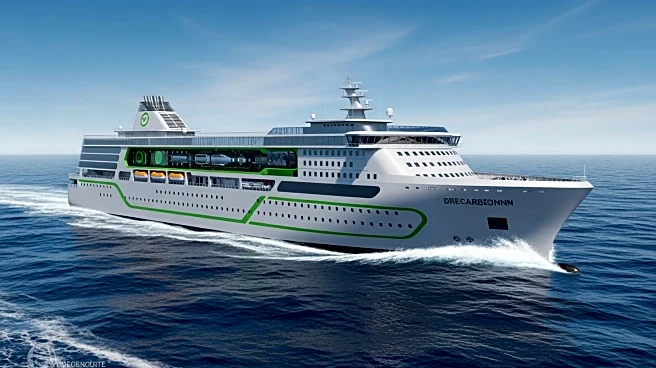What's Happening?
The International Maritime Organization (IMO) has concluded a week of meetings focused on the Net-Zero Framework aimed at reducing greenhouse gas emissions from ships. Despite initial setbacks and confusion, the working group made progress on technical
guidelines and the Net Zero Fund. Observers noted constructive participation from various parties, including those previously opposed, leading to advancements in key areas such as energy transition incentives and lifecycle analysis of fuels. The discussions also highlighted the growing momentum for wind-assisted propulsion, with nearly 100 large vessels already utilizing this technology. The IMO plans to continue discussions in upcoming summits scheduled for April and October 2026.
Why It's Important?
The progress made by the IMO is crucial for the global shipping industry, which is a significant contributor to greenhouse gas emissions. The development of the Net-Zero Framework could lead to substantial reductions in emissions, aligning with international climate goals. The involvement of various stakeholders, including NGOs and industry representatives, indicates a collaborative effort to address environmental concerns. Successful implementation of the framework could set a precedent for other industries, promoting sustainable practices and technologies. However, the delay in finalizing the framework highlights ongoing challenges in achieving consensus among member states.
What's Next?
The IMO is scheduled to reconvene in April 2026 for a two-part summit, including the next session of the Marine Environment Protection Committee. These meetings aim to finalize important decisions and continue negotiations on the Net-Zero Framework. Member states are expected to address unresolved issues and work towards a comprehensive agreement. The outcome of these discussions will be critical in determining the future direction of the shipping industry's decarbonization efforts. Stakeholders will likely continue to advocate for transparency and integrity in the process, emphasizing the need for pollution cuts to benefit future generations.
Beyond the Headlines
The IMO's efforts to advance the Net-Zero Framework reflect broader challenges in international climate policy, where economic interests often clash with environmental goals. The resistance from certain states underscores the complexity of achieving global consensus on climate action. The focus on wind propulsion and biofuels highlights the potential for innovative solutions to drive sustainability in shipping. As the industry navigates these changes, ethical considerations around equity and justice in climate action remain central to the discussions.















